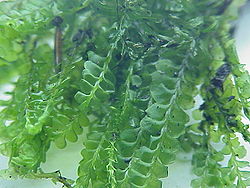| Plagiochila | |
|---|---|
 | |
| Plagiochila asplenioides | |
| Scientific classification | |
| Kingdom: | Plantae |
| Division: | Marchantiophyta |
| Class: | Jungermanniopsida |
| Order: | Lepidoziales |
| Family: | Plagiochilaceae |
| Genus: | Plagiochila (Dumort.) Dumort., 1835 nom. cons. |
| Species | |
See text | |
| Synonyms | |
| |
Plagiochila is a large, common, and widespread genus of liverworts in the order Jungermanniales. [1] It is a member of the family Plagiochilaceae within that order. There may be anywhere from 500 to 1,300 species, most of them from the tropics; the exact number is still under revision.
